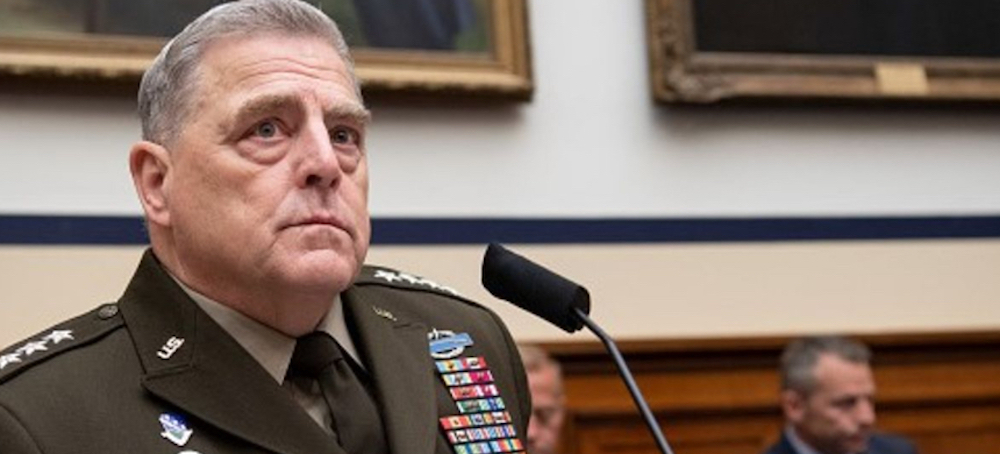
The former president is inciting violence against the chairman of the Joint Chiefs of Staff. America’s response is distracted and numb.
Late Friday night, the former president of the United States—and a leading candidate to be the next president—insinuated that America’s top general deserves to be put to death.
That extraordinary sentence would be unthinkable in any other rich democracy. But Donald Trump, on his social-media network, Truth Social, wrote that Mark Milley’s phone call to reassure China in the aftermath of the storming of the Capitol on January 6, 2021, was “an act so egregious that, in times gone by, the punishment would have been DEATH.” (The phone call was, in fact, explicitly authorized by Trump-administration officials.)
And yet, none of the nation’s front pages blared “Trump Suggests That Top General Deserves Execution” or “Former President Accuses General of Treason.” Instead, the post barely made the news. Most Americans who don’t follow Trump on social media probably don’t even know it happened.
Trump’s rhetoric is dangerous, not just because it is the exact sort that incites violence against public officials but also because it shows just how numb the country has grown toward threats more typical of broken, authoritarian regimes. The United States is not just careening toward a significant risk of political violence around the 2024 presidential election. It’s also mostly oblivious to where it’s headed.
Trump loves to hide behind the thin veneer of plausible deniability, but he knows exactly what he’s doing. If a mob boss were to say, “In times gone by, people like you would have had their legs broken,” nobody would mistake that for a historical observation. The suggestion is clear, and it comes from a man who has one of America’s loudest megaphones—one that is directed squarely at millions of extremists who are well armed, who insist that the government is illegitimate, and who believe that people like Milley are part of a “deep state” plot against the country.
Academics have a formal term for exactly this type of incitement: stochastic terrorism. An influential figure with a large following demonizes a person or a group of people. The likelihood is strong that some small number of followers will take those words literally—when Trump implies that Milley deserves to be put to death, some of his disciples might take it as a marching order. The number of those who take action does not have to be large for the result to be horrific.
Already, one of Trump’s minions in Congress has echoed the incitement to violence. The Republican Paul Gosar of Arizona wrote—in his taxpayer-funded newsletter, no less—that “in a better society, quislings like the strange sodomy-promoting General Milley would be hung.” The meaning is not ambiguous: Gosar is explicitly saying that killing Milley would be desirable.
As a political scientist who studies political violence across the globe, I would chalk up the lack of high-profile assassinations in the United States during the Trump and post-Trump era to dumb luck. Already in 2018, one deranged Trump follower, Cesar Sayoc, sent pipe bombs to public figures (and a media organization) who just so happened to be among those whom Trump most often attacked in his Twitter feed. Thankfully, nobody died—not because the dangers of Trump’s rhetoric were overstated but because Sayoc was bad at building bombs.
Heading toward one of the most consequential, divisive elections in American history, every ingredient in the deadly recipe for political violence is already in the mix: high-stakes, winner-take-all politics; widespread conspiratorial delusions that detach followers from objective realities; a suggestion that one’s political opponents aren’t “real Americans”; a large supply of violent extremists with easy access to deadly weaponry; and a movement whose leader takes every opportunity to praise those who have already participated in a deadly attack on the government.
Eventually, all luck runs out. Political violence is notoriously difficult to forecast with precision, but would anyone really be surprised if Trump’s violent rhetoric led to real-world attacks in the run-up to the 2024 election—or in its aftermath, if he loses?
For all of these reasons, Trump’s recent unhinged rant about Milley should be a wake-up call. But in today’s political climate, the incident barely registers. Trump scandals have become predictably banal. And American journalists have become golden retrievers watching a tennis-ball launcher. Every time they start to chase one ball, a fresh one immediately explodes into view, prompting a new chase.
Eventually, chasing tennis balls gets old. We become more alive to virtually any distraction: The media fixate on John Fetterman’s hoodie instead of on stories about the relentless but predictable risk of Trump-inspired political violence.
Bombarded by a constant stream of deranged authoritarian extremism from a man who might soon return to the presidency, we’ve lost all sense of scale and perspective. But neither the American press nor the public can afford to be lulled. The man who, as president, incited a violent attack on the U.S. Capitol in order to overturn an election is again openly fomenting political violence while explicitly endorsing authoritarian strategies should he return to power. That is the story of the 2024 election. Everything else is just window dressing.
The suggestion is clear, and it comes from a man who has one of America’s loudest megaphones—one that is directed squarely at millions of extremists who are well armed, who insist that the government is illegitimate, and who believe that people like Milley are part of a “deep state” plot against the country.



No comments:
Post a Comment